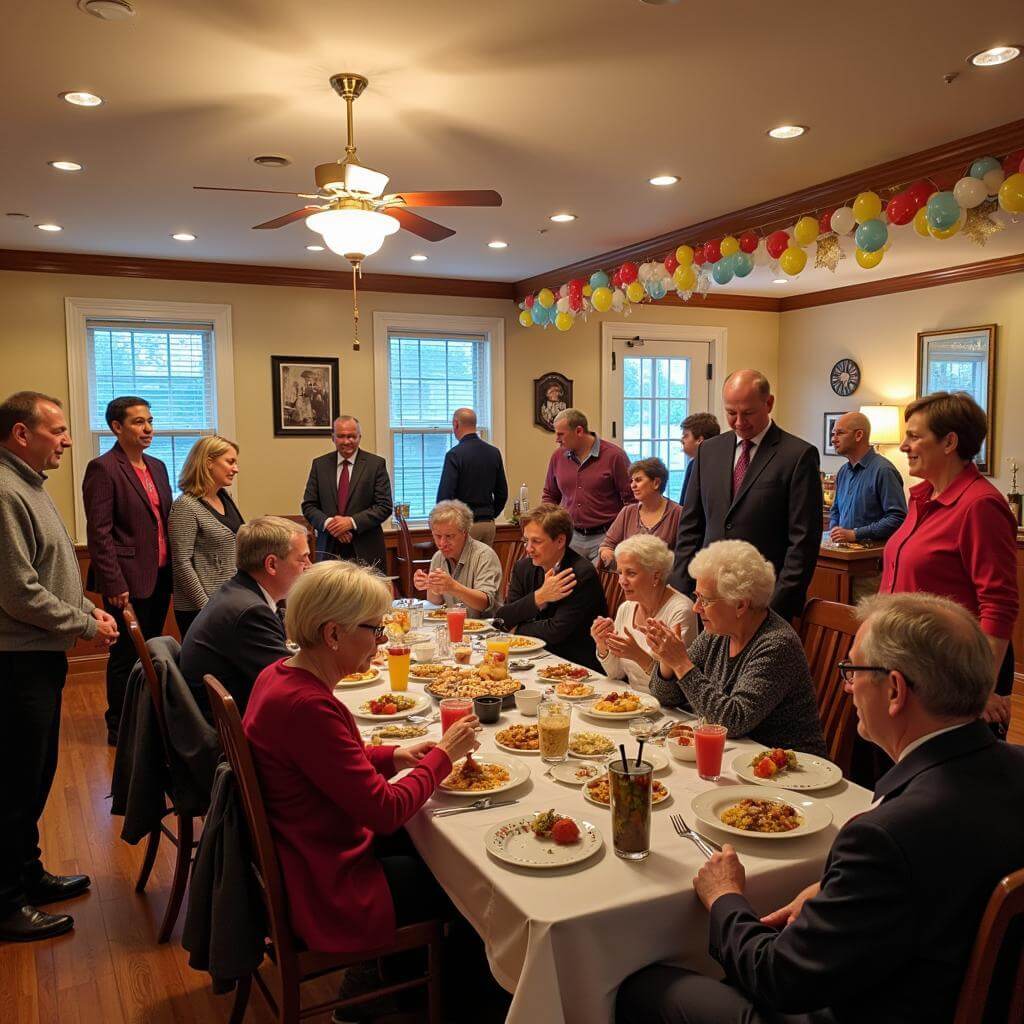Family gatherings are a common topic in IELTS Speaking tests, often appearing in Part 1 and Part 2. The ability to describe such events effectively can significantly boost your score. This article will guide you through answering questions about a memorable family gathering, providing sample responses for different band scores and essential vocabulary to help you excel in your IELTS Speaking test.
Part 1: Introduction and Interview
In this section, the examiner may ask you questions like:
- Do you often have family gatherings?
- What do you usually do during family gatherings?
- Are family gatherings important in your culture?
Let’s look at a sample answer for the first question:
Examiner: Do you often have family gatherings?
Sample answer (Band 7-8):
“Yes, I’d say we have family gatherings quite frequently. We typically get together for major holidays like Christmas and Easter, as well as for special occasions such as birthdays and anniversaries. These gatherings are a great way for us to catch up and maintain strong family bonds, especially since some of my relatives live in different cities.”
Describe a recent family gathering that was enjoyable
Part 2: Long Turn (Cue Card)
Here’s a sample cue card related to the topic:
Describe a memorable family gathering you attended
You should say:
- When and where it took place
- Who was there
- What you did during the gathering
- And explain why it was memorable for you
Sample answer (Band 6-7):
“I’d like to talk about a family gathering that took place last summer at my grandparents’ house in the countryside. It was a reunion to celebrate my grandparents’ 50th wedding anniversary.
Almost all of my extended family was there, including my parents, siblings, aunts, uncles, and cousins. There were about 30 people in total, which made it quite a lively event.
During the gathering, we had a big barbecue in the backyard. Everyone helped with the cooking and setting up tables. We played some games like volleyball and card games. In the evening, we had a special ceremony where my grandparents renewed their vows, which was very touching.
This gathering was memorable because it was rare to have so many family members together in one place. The atmosphere was warm and joyful, and it was great to catch up with relatives I hadn’t seen in a long time. Seeing my grandparents so happy after 50 years of marriage was also very inspiring.”
Sample answer (Band 8-9):
“I’d like to reminisce about a particularly memorable family gathering that took place last summer to commemorate my grandparents’ golden wedding anniversary. The event was held at their picturesque country home, which provided an idyllic backdrop for such a momentous occasion.
The gathering was a veritable reunion of our extended family, with relatives traveling from far and wide to attend. We had a diverse mix of generations present, from great-grandchildren to great-aunts and uncles, creating a rich tapestry of family connections.
The day was filled with a plethora of activities. We started with a sumptuous barbecue lunch in the sprawling backyard, where everyone pitched in with the preparations. The afternoon was spent engaging in various games and activities, from spirited volleyball matches to more sedate card games for the older folks. The highlight of the evening was undoubtedly the touching ceremony where my grandparents renewed their vows, which left hardly a dry eye among the attendees.
This gathering stands out in my memory for several reasons. Firstly, the sheer rarity of having such a large number of family members in one place created an electric atmosphere of joy and connection. It was profoundly heartwarming to witness the intergenerational bonds being strengthened as cousins who hadn’t met in years rekindled their relationships and older relatives shared family stories with the younger generation.
Moreover, seeing my grandparents’ enduring love after half a century of marriage was not just touching but truly inspirational. Their commitment to each other and to the family they had built was palpable throughout the event, serving as a poignant reminder of the importance of family ties and the value of nurturing relationships over time.
In essence, this gathering was more than just a celebration; it was a reaffirmation of our family’s shared history and values, and a cherished memory that I’m sure will stay with all of us for years to come.”
Follow-up questions:
- How often do you have such large family gatherings?
- What are some challenges in organizing big family events?
Sample answer for question 1 (Band 8-9):
“Large-scale family gatherings like the one I described are relatively infrequent in our family, primarily due to the logistical challenges involved in coordinating so many people’s schedules and the geographical dispersion of our relatives. We typically manage to organize such extensive reunions every few years, usually coinciding with significant milestones or special occasions like major anniversaries, landmark birthdays, or sometimes during holiday seasons when travel is more feasible for most family members.
That said, we do make a concerted effort to maintain regular contact through smaller, more frequent gatherings. These might involve immediate family members or smaller groups of relatives who live in closer proximity. We also leverage technology to stay connected, using video calls and group chats to bridge the physical distance between us. This approach helps us strike a balance between the practicality of our day-to-day lives and the importance we place on maintaining strong family bonds.”
Describe a memorable family celebration
Part 3: Two-way Discussion
Examiner: How have family gatherings changed over the years in your country?
Sample answer (Band 7-8):
“Family gatherings have undergone significant changes in recent years in my country. One notable shift is the frequency of these gatherings. In the past, extended families often lived close to each other, making frequent gatherings easier. However, with increased urbanization and people moving for work, gatherings have become less frequent but often more elaborate when they do occur.
Another change is the nature of activities during these gatherings. Traditionally, they were centered around meals and conversation. Now, there’s often a wider range of activities, including outdoor sports, group games, or even organized outings. This shift reflects a desire to make the most of the limited time families have together.
Technology has also played a role in changing family gatherings. While it has made it easier to stay in touch virtually, it has also sometimes led to less engaged interactions during physical gatherings, with some family members glued to their devices.
Lastly, there’s been a change in the formality of these gatherings. In the past, they were often quite formal affairs, especially in the presence of elders. Now, there’s generally a more relaxed atmosphere, reflecting broader societal changes in intergenerational relationships.”
Examiner: Do you think family gatherings are becoming less important in modern society?
Sample answer (Band 8-9):
“The importance of family gatherings in modern society is a nuanced issue that doesn’t lend itself to a simple yes or no answer. On one hand, there are factors that might suggest a decline in their significance. The fast-paced nature of modern life, increased geographical mobility, and the rise of digital communication have all contributed to making traditional, frequent family gatherings more challenging to organize and attend.
However, I would argue that rather than becoming less important, family gatherings are evolving in their form and function to adapt to contemporary realities. In fact, in many ways, they may be gaining importance as a counterbalance to the increasing isolation that can come with modern lifestyles.
Firstly, in a world where face-to-face interactions are becoming rarer due to digital communication, physical family gatherings provide a crucial opportunity for genuine, in-person connections. They offer a respite from the virtual world and allow for the kind of deep, meaningful interactions that are hard to replicate online.
Secondly, as work pressures and social commitments increase, family gatherings serve as important anchors, providing a sense of stability and continuity in people’s lives. They offer a chance to reconnect with one’s roots and reaffirm familial bonds, which can be particularly valuable in times of stress or uncertainty.
Moreover, in an era of increasing cultural homogenization, family gatherings often serve as a vehicle for cultural transmission, allowing older generations to pass down traditions, stories, and values to younger family members. This role in preserving cultural identity arguably makes them more important than ever.
Lastly, there’s a growing body of research highlighting the positive impacts of strong family connections on mental health and overall well-being. As awareness of these benefits increases, many people are making a conscious effort to prioritize family gatherings, viewing them as essential for maintaining psychological health and life satisfaction.
In conclusion, while the frequency and format of family gatherings may be changing, their fundamental importance in fostering connections, providing support, and maintaining cultural continuity suggests that they remain a vital component of modern society, albeit in an evolving form.”
Describe a time you attended a wedding or celebration
Key Vocabulary and Phrases
To enhance your speaking performance, incorporate these words and phrases:
-
Commemorate (verb) /kəˈmem.ə.reɪt/ – to remember officially and give respect to a great person or event
Example: “We gathered to commemorate our grandparents’ 50th wedding anniversary.” -
Momentous (adjective) /məˈmen.təs/ – very important or significant
Example: “It was a momentous occasion for our entire family.” -
Rekindle (verb) /ˌriːˈkɪn.dəl/ – to make something start again or become active again
Example: “The gathering helped us rekindle relationships with distant relatives.” -
Palpable (adjective) /ˈpæl.pə.bəl/ – so obvious that it can easily be seen or noticed
Example: “The love between my grandparents was palpable throughout the event.” -
Nurture (verb) /ˈnɜː.tʃər/ – to help someone or something to grow, develop, or succeed
Example: “Family gatherings help nurture strong bonds between relatives.”
Describe an event you attended that had excellent food
Examiner’s Advice
To excel in the IELTS Speaking test when describing a family gathering:
- Use a variety of descriptive adjectives to make your account vivid and engaging.
- Incorporate idiomatic expressions naturally to demonstrate language fluency.
- Vary your sentence structures, using a mix of simple and complex sentences.
- Show reflection by explaining why the gathering was memorable or important to you.
- Practice speaking about different types of family gatherings to improve your versatility.
Remember, the key to a high score is not just what you say, but how you say it. Aim for fluency, coherence, and a wide range of vocabulary and grammatical structures.
Describe a memorable meal you shared with family
 Family gathering with diverse generations
Family gathering with diverse generations
By following these guidelines and incorporating the provided vocabulary and phrases, you’ll be well-equipped to describe a memorable family gathering in your IELTS Speaking test, potentially boosting your score significantly.


